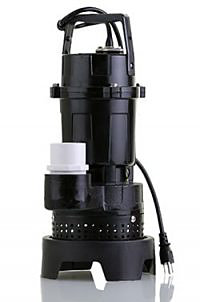How to Avoid a Basement Flood in the Spring

If you have ever walked downstairs to soggy carpet and dripping walls, you know just how stressful a basement flood can be… and how expensive.
It is estimated that 90-95% of all basements in the Atlanta area will experience water damage that can result in costly repairs. For every inch of rain, the average roof sheds 1000 gallons of water onto the ground surrounding your house. Even small leaks can produce moisture and increase the humidity level, creating a breeding ground for mold and mildew.
Your basement isn’t truly “finished” until you have taken measures to prevent future damage. The first step is usually to install a sump pump, which pushes excess ground water away from your house. These pumps help keep your basement dry while also protecting the foundation of your house from changes to the water table. While sumps pumps provide you with increased peace of mind, occasionally they can fail.
Here are six more things you can do to protect your home from a basement flood:
- Install a battery-powered sump pump backup. Commonly, sump pumps fail due to an electrical reason, such as a power failure, tripped circuit breaker, or a blown fuse. To ensure that your basement remains dry during a temporary power outage, install a 120-volt battery backup. It’s worth the minimal extra investment. Some systems come with an alarm that sounds whenever the battery backup is engaged.
- Install a water alarm. If you do get water in your basement, you want to know as soon as possible to minimize the damage. Water alarms detect water where it is not supposed to be and alert you. Basic ones simply make a loud sound, which is only useful if you are home to hear it. Many models will call you or even connect with your broader security system.
- Service your sump pump regularly. Schedule an appointment with a professional to ensure that everything is working correctly within the sump pump, the well is free of debris, and the pipes are clear. Most pumps should be replaced every 5-10 years, depending on the model.
- Inspect your sewer and septic systems. The only thing worse than water in a basement is sewage. During periods of heavy rainfall, clogged sewers and overworked septic systems can become ticking time bombs.
- Divert water away from your home. According to Wikihow.com, there are some things you can do to cut down on the amount of work your sump pump must do to keep your basement dry. For example, extend downspouts at least 3-6 feet away from your house, clean your gutters every spring and fall, seal cracks in your foundation, install window well covers, and ensure your yard slopes down away from your home.
- Be prepared. Despite our best efforts, most basements will experience some dampness at some point. Taking the protective measures above will successfully minimize any damage you may experience. Just in case, put valuables and electrical equipment on shelves, off the floor. Avoid expensive furniture and non-synthetic carpeting. Also, consider installing a flood drain in the floor and a dehumidifier to reduce moisture.
Related Reading
Subscribe To Our Newsletter
Get up-to-date current news, promotions, and industry tips.
